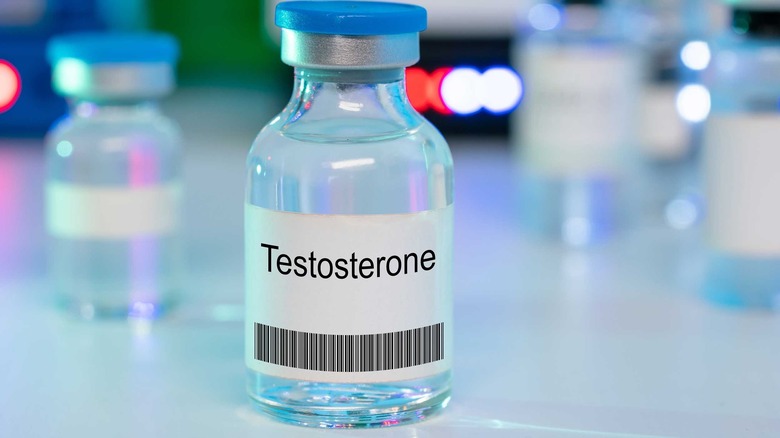Why Are Men More Prone To Certain Cancers?
At one point or another, most individuals in the world will succumb to cancer. Age, lifestyle choices, and medical history can be huge factors in assessing your cancer risk. But surprisingly enough, so can sex.
According to the American Cancer Society, men are more likely than women to get several types of shared cancers, and risk factors don't explain it. Cancers with a higher risk for men include esophageal, colorectal, bladder, and melanoma (cancers like prostate cancer are excluded from the list due to being male-specific). Researchers have conducted several studies over the years to account for the differences. Mainly, these seem to come down to biological, hormonal, and genetic factors. Even the fact that men are typically taller than women can play into cancer's sexual disparity.
Here, we use current research to break down a few reasons why men have more cancer than women. See why genetic predisposition and hormones make it so important for men to get regular cancer screenings and checkups with their healthcare professionals.
The Y chromosome is a possible culprit
The main difference between men and women is the chromosomes, so it only makes sense that this is the first place researchers started their inquiry. Males are born with an XY chromosome, while females have an XX. That tricky Y comes into play in two different ways when cancer starts to wreak havoc on a man's body.
A 2023 study in Nature explored the gender differences between colorectal cancer in mice. Throughout the study, male mice experienced worse outcomes than their female counterparts. The reasoning comes down to a gene on the Y chromosome called KDM5D, which turned off specific cancer-fighting genes. This allowed the cancer cells to grow and prosper. The study noted that "deletion of Kdm5d in iKAP cancer cells increased tight junction integrity, decreased cell invasiveness, and enhanced cancer cell killing by CD8+ T cells." However, having a Y chromosome isn't always the issue. The Y getting deleted also causes cancer to grow.
Another study published by Nature in 2023 showed the loss of the Y chromosome in older males with bladder cancer caused worse cancer outcomes. This was because the missing Y chromosome allowed specific tumor mutations to flourish, which could alter T-cell function. But it's not all the Y chromosome's fault. Having two X chromosomes is also shown to have built-in immunity.
The X chromosome has a cancer suppressor
Having a Y chromosome or losing a Y chromosome through age can work to make cancers impact males more than females. But the X chromosome also comes into play when examining why some cancers affect men more than women.
Dr. Andrew Lane of the Dana-Farber Cancer Institute broke down for WBUR that it has to do with the specific genes that don't get shut down during X inactivation, whereas the female body naturally shuts down the additional X chromosome. About 50 or so genes escape the process giving women two copies. Dr. Lane says, "Females are protected from cancer to some relative extent because they have two copies of these genes whereas males only have one." Though it's unknown why this happens, it gives women some added protection that men lack. And when they looked at those specific genes and cancer, they made an impact.
Beyond just sex chromosomes, another distinction between the sexes is the levels of specific hormones within their bodies. Like estrogen, testosterone can be good or bad for cancer — depending on the levels.
Testosterone impacts male cancers
Hormones can be tricky little buggers when it comes to your body. Estrogen is all over the news for its role in certain breast cancers, but what about testosterone? Several studies found that testosterone can affect cancer positively and negatively depending on the quantity. And it does play a role in male cancer.
A study in 2022 in the Journal of Translational Medicine showed that testosterone levels increased the risk for prostate cancer, one of the most common cancers among men. The Centers for Disease Control and Prevention (CDC) noted that about 13% of American men will get prostate cancer in their lifetime, which is a pretty significant risk. Additionally, a 2017 study in Acta Endocrinologica (Buc) found that different levels of testosterone could affect colorectal cancer in either a positive or negative way. So, the levels of testosterone within a person's body, which vary naturally, could play an essential part in a cancer diagnosis. It could also play a role in helping find appropriate treatment for prostate cancer and others.
Testosterone needs more testing to find out how large of a role it might play in male cancers, but the possibility that it accounts for some of the cancer's sex disparity. But it's not all about the hormones. Growth also affects cancer risk.
Height's role in cancer
Being tall seems like it would have its advantages. You don't need step stools to reach things in the top cupboard, and you'll never miss the opportunity to ride amusement park rides. However, being tall also comes with an increased risk of cancer.
It might seem a bit strange that height and cancer are correlated. But getting to the height you're at doesn't just happen for no reason. Specific hormones and developmental factors come into play rather than just your distance from the ground. According to the World Cancer Research Fund International, these factors that helped you to grow to 5'8" or 6' play into your overall cancer risk. But it's not all about how your body has grown and changed; size also comes into play. In John Hopkins Medicine, Elinor Zhou, M.D., stated, "One possible reason for this link is that adult height correlates with body organ size. More active proliferation in organs of taller people could increase the possibility of mutations, leading to malignant transformation."
It makes sense in the grand scheme of things. The more cells you have, the more likely you are to develop cancer. And since men have been historically taller than women, it would significantly affect that portion of the population.
Male skin differences affect cancer
One of the more common cancers affecting men is melanoma. Commonly known as skin cancer, the disparity between the two sexes largely depends on age, according to the American Academy of Dermatology Association (AAD), but men are more likely at all age levels to get melanoma. Some of the reasoning behind this comes down to behavior patterns. For example, men are less likely than women to use sunscreen and sun protection on their skin.
There are also some biological factors at play, according to the AAD. Men's skin is thicker, with more collagen and elasticity but less fat. It might not seem like a big difference, but it allows the UV rays to get in there easier and cause more damage, leading to higher levels of cancer. A study published in 2016 in the National Library of Medicine hypothesized that women might also have more protection from UV rays built into their skin. But more research needs to be done in this area.
The research for why men are more susceptible to cancer is still ongoing. But many genetic, biological, and lifestyle factors influence the sexual disparity. Getting screened regularly and following the recommended guidelines to protect yourself will be your first line of defense.






